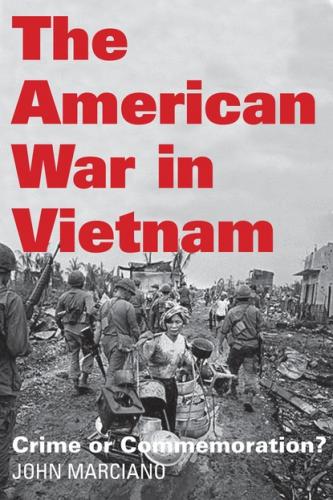The American War in Vietnam
The American War in Vietnam
Crime or Commemoration?
by JOHN MARCIANO
Copyright © 2016 by John Marciano
All Rights Reserved
Library of Congress Cataloging-in-Publication Data:
Name: Marciano, J. D., author.
Title: The American war in Vietnam : crime or commemoration? / by John Marciano.
Description: New York : Monthly Review Press, [2016] | Includes bibliographical references and index.
Identifiers: LCCN 2016017663| ISBN 9781583675854 (pbk.) | ISBN 9781583675861
(hardcover) | ISBN 9781583675878 (e-book trade) | ISBN 9781583675885 (e-book institution)
Subjects: LCSH: Vietnam War, 1961-1975--United States. | Vietnam War, 1961-1975--Moral and ethical aspects. | Memorialization—Political aspects—United States.
Classification: LCC DS558 .M354 2016 | DDC 959.704/3373—dc23
LC record available at https://lccn.loc.gov/2016017663
Typeset in Minion Pro
Monthly Review Press, New York
5 4 3 2 1
Contents
Introduction: The Commemoration Story
1. The Noble Cause Principle and the Actual History
2. French Colonialism and the Origins of the American War in Vietnam
3. The Diem Regime and President John F. Kennedy
4. President Johnson and Escalation of the War
5. President Nixon, “Vietnamization,” and the End of the War
6. Some Lessons and Myths of the American War in Vietnam
for Bill Griffen
Husband, father, teacher, scholar, writer, musician, baseball player, fighter for justice and peace who stayed the course. My friend.
Acknowledgments
Some years ago, my late SUNY Cortland colleague Bill Griffen and I planned to update our critical examination of the American War in Vietnam and its treatment in secondary history texts (Teaching the Vietnam War, 1979). It was not to be, however, because of his death in February 2007 from prostate cancer. I labored on this book, therefore, in the spirit of our loving intellectual and political comradeship. Bill had retired in 2006 after fifty-one years of teaching as the longest-serving professor in the history of the State University of New York.
A special thanks goes to my first and toughest reader, Jeff Cooper, for his long and patient, no-nonsense review and suggestions. I also wish to thank Bill Ehrhart, Marilyn Young, Fred Wilcox, and Jeremy Kuzmarov for their careful reading of the entire work, and Noam Chomsky for somehow finding the time to read the final chapter. Thanks also go to Philip Bennett, Carl Mirra, Edward Morgan, Jim O’Brien, and John Ryder for comments on the original proposal and individual sections; Joe Montuori, for his invaluable help on secondary history textbooks; Judy Griffen, Bill’s widow, for her steadfast support; my wife, Leslie Dwyer, who stayed the course with me over the two years of work and kept asking, “Who’s your audience?”; Michael Yates of MR Press for his editorial assistance and belief in this project; and Erin Claremont for her excellent copy editing.
I trust that all those above will find this work worthy of their efforts.
INTRODUCTION
The Commemoration Story
In May 2012, President Barack Obama and the Pentagon announced a Commemoration of the Vietnam War to continue through 2025, the fiftieth anniversary of the conflict’s end. Among the Commemoration’s objectives, three stand out: “To thank and honor” veterans of the war and their families, including those “who were held as prisoners of war or listed as missing in action for their service and sacrifice on behalf of the United States”; to “highlight the advances in technology, science, and medicine related to military research conducted during” the war; and to “recognize the contributions and sacrifices made by the allies.…” The Commemoration will sponsor thousands of activities over the next ten years, including concerts, educational curricula, school visits by veterans, symposia, school projects, memorial festivities, and POW/MIA ceremonies.
Also that May, Obama gave a Commemoration speech at the Vietnam War Memorial in Washington. He urged the nation to honor veterans who fought—an implicit call to honor the cause for which they fought, and to deter challenges to the official story. The American war in Vietnam remains “one of the most painful chapters in our history … most particularly, how we treated our troops who served there.… You were sometimes blamed for misdeeds of a few when the honorable service of the many should have been praised.” Was he thinking of the My Lai massacre? “You came home and sometimes were denigrated, when you should have been celebrated. It was a national shame, a disgrace that should have never happened.”
The Commemoration is “another chance to set the record straight.” Obama emphasized the POW issue, as he praised those who “wrote one of the most extraordinary stories of bravery and integrity in the annals of military history.” In a criticism of the antiwar movement, he cited the need to tell the story of “how … some Americans turned their back on you.…” In a brief sentence, he urged Americans to “never forget the costs of war, including the terrible loss of innocent civilians—not just in Vietnam.…” He erased from history, however, the millions of Vietnamese who were killed, maimed, and became refugees.
Obama claimed that Americans “hate” war. “When we fight, we do so to protect ourselves because it’s necessary.” Although acknowledging the “deep divisions” the conflict produced at home, he asserted that “in our democracy we can debate and disagree—even in a time of war.… Patriots can support a war; patriots can oppose a war.” Regardless of our powerful differences, however, we must “always stand united in support of our troops.…” Like many presidents before him, Obama closed his speech by calling upon God to bless “our men and women in uniform [and] these United States of America.”
The Commemoration objectives and Obama’s speech reveal the official story that will be taught about the American war in Vietnam—and will be challenged in this book. This official story has many lessons.
The most fundamental lesson is that the war in Vietnam was fought on behalf of “the ideals we hold dear as Americans.” Obama and the Vietnam Commemoration
